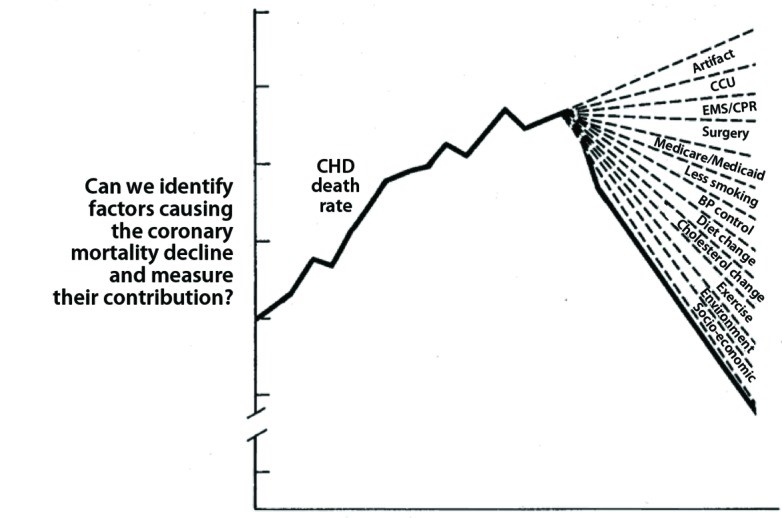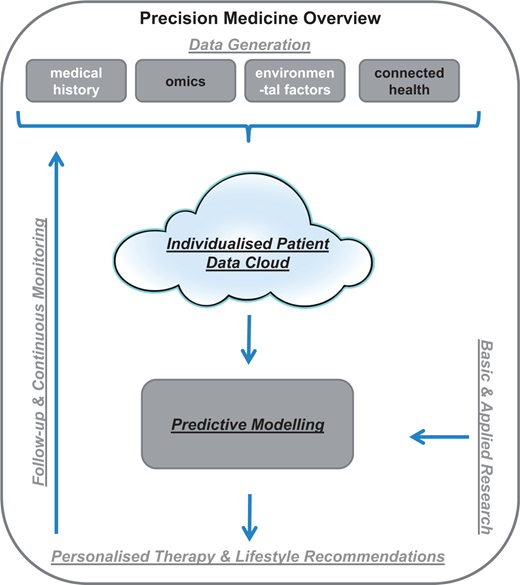 Cardiovascular disease is famously known as a disease that “rose from relative oblivion to the uno numero killer worldwide.” Globally, there were an estimated 422.7 million cases of cardiovascular diseases (CVD) and 17.92 million deaths in 2015. Over the past 50 years, significant efforts have been made to suppress or even eradicate cardiovascular diseases. The figure1 to the left is adopted from Havlik and Feinleib illustrates the various strategies applied to reduce the deaths associated with coronary heart disease, which are also relevant for CVD more broadly.
Cardiovascular disease is famously known as a disease that “rose from relative oblivion to the uno numero killer worldwide.” Globally, there were an estimated 422.7 million cases of cardiovascular diseases (CVD) and 17.92 million deaths in 2015. Over the past 50 years, significant efforts have been made to suppress or even eradicate cardiovascular diseases. The figure1 to the left is adopted from Havlik and Feinleib illustrates the various strategies applied to reduce the deaths associated with coronary heart disease, which are also relevant for CVD more broadly.
While discussions are aimed towards who or what deserves the credit for this decline, the prevention and cure still remain obscure, highlighting that we need a shift in management of these patients. Currently, the approach to CVD treatment is evidence-based medicine. This supposes “one size fits all,” that individuals with common symptoms share the same disease and will respond to similar management strategies, and ignores that patients are unique at large. Moreover, current healthcare is expensive and inefficient at most part.
Precision Medicine
 Precision medicine represents a new approach where patient care is targeted towards prevention and cure considering individual differences of patients. The goal is to identify what’s best for a particular patient than what benefits the average population. As figure to the left shows, it is aimed to achieve through the accumulation of personalised data (clinical, biological, environmental & genetic) and computed predictive models that will inform logical therapy for each patient2.
Precision medicine represents a new approach where patient care is targeted towards prevention and cure considering individual differences of patients. The goal is to identify what’s best for a particular patient than what benefits the average population. As figure to the left shows, it is aimed to achieve through the accumulation of personalised data (clinical, biological, environmental & genetic) and computed predictive models that will inform logical therapy for each patient2.
The success of precision medicine relies on extensive clinical testing, electronic health records, genetic profiling, big data sets, and novel analytical and implementation methods to create a person-specific information that can then be used to identify an optimal intervention with minimal risk.
The benefits of precision medicine included better medical management, safer dosing options, reduced adverse events, reduce inappropriate procedures and medical interventions, and improved patient management.
Precision Medicine in Cardiology and Challenges
Cardiology has been slower than other disciplines in pursuing precision medicine. This is now changing as several attempts are beginning to take shape. Efforts are in place to define distinctive patient groups, identify molecular targets, develop risk models and evaluate the effects of drugs through genome scale metabolic models. But there are several barriers in precision medicine that also limits the widespread application and advancement of it in modern medicine. First of all, the multidisciplinary approach requires synchronisation between several departments, calls for advances in technology, regulatory oversights, big data storage, and ethical concerns with the use of genetic information storage.
There is also a large concern that precision medicine is just like stem cell revolution, where the promise to become what it is may not be achievable but will have incremental gains on a case by case basis. But by comprehensive understanding, united efforts, clinical application, evidence-based practices and technological advancements, precision medicine could change the entire landscape of cardiovascular health care system in the near future.
References:
- Jones DS and Greene JA. The decline and rise of coronary heart disease: understanding public health catastrophism. American journal of public health. 2013;103:1207-1218.
- Duffy DJ. Problems, challenges and promises: perspectives on precision medicine. Briefings in Bioinformatics. 2015;17:494-504.